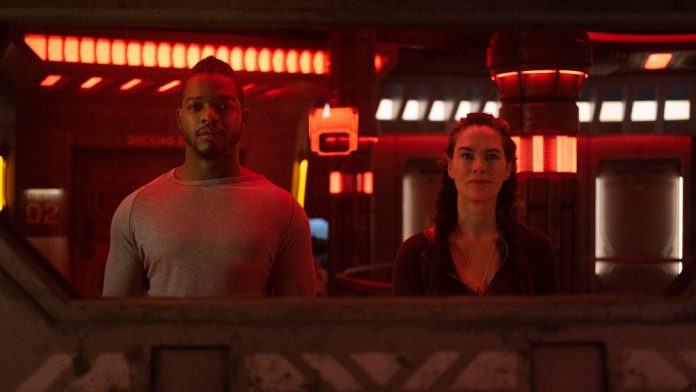The new serial drama Beacon 23 on MGM+, adapted by Zak Penn for television from the novel by Hugh Howey, has all the deep space eye candy to satisfy sci-fi fans, featuring two people (Lena Headey and Stephan James) who become trapped together in a lighthouse in the darkest recesses of the universe. Set in the 23rd century, it’s much more of a cinematic suspense thriller and love story, which was the creative intent of Glen Mazzara, who was elevated from consulting producer to showrunner of the eight-episode series.
Mazzara is a multi-hyphenated writer/ creator/showrunner attracted to projects that have the potential to move beyond the boundaries of traditional television. His impressive credits include consulting as a producer for The Rookie on ABC. He developed and created Damien, the A&E series based on the classic horror film The Omen, The Shield on FX, and Crash, the first scripted drama on Starz. Perhaps his biggest cinematic accomplishment for television can be seen in The Walking Dead (AMC), where he began as a freelance writer, graduating to writer/producer and ultimately showrunner for seasons two and three.
Above The Line spoke with Glen Mazzara via Zoom, where he was at home in Los Angeles. He discussed his passion for sci-fi and horror and the cinematic development of Beacon 23, making sure the visual effects didn’t eclipse the storytelling. He also admitted there are some pretty cool VFX elements, such as a never-before-seen flying droid and the futuristic AI character, which ironically has been pushing a lot of buttons with its current technology in the real world.
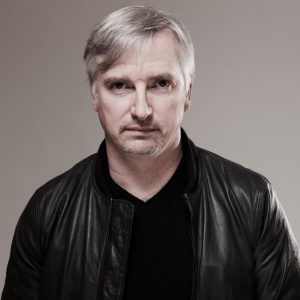
Above The Line: It’s nice to meet you. I’m such a fan of all the shows that you work on. I’d love to start with what’s the difference between a consulting producer and then making that jump to showrunner?
Glen Mazzara: First of all, thank you. Well, that’s interesting. I don’t know if anyone’s ever asked me that. I have been friendly with Zak [Penn] for a number of years. We did a lot of work at the Writer’s Guild together. We sat next to each other in board meetings. I bumped into him, and he told me about the show, and I said, “Oh, that sounds interesting.” He said there’s more than enough work to go around if you want to come in and kind of help punch up scripts and work on the show. So I started doing that, and I have a lot of production experience, and this was a huge production. At one point, Zak needed to kind of step off for other engagements, and the production was taking longer, so it made sense to hand it off to somebody who loved the show. I would say I came in, because I was excited about the material and about working with Zak, so I stepped in as showrunner. I think it made sense to have somebody who had a lot of production experience to kind of step in and continue, just sort of telling the story and tightening things up.
ATL: What was so tough about the production?
Mazzara: It was a tough production, just in the sense that there’s a lot of story to track. The fact that there was a very small cast is very hard on the actors. They really were working around the clock, and then we were shooting this during COVID, so there were precautions that you had to take. It was all interior; they’re trapped in space.
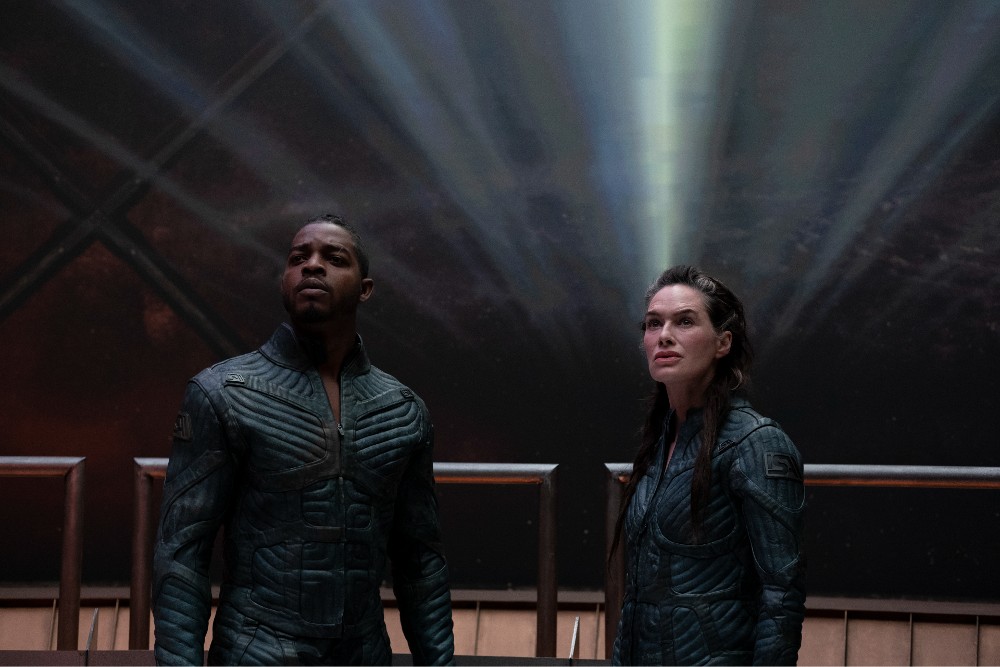
ATL: How tiny a space was it that Lena Headey and Stephan James had to occupy?
Mazzara: It’s actually a surprisingly big set. It’s a beautiful set. It’s really a remarkable set. It takes several stages. It’s a very epic set. It was really like being a kid in a candy store. When I walked through it for the first time, it was really exciting and beautifully designed. We didn’t want the visual effects to distract from the characters. We really wanted to make sure that it felt like our characters were trapped in this small space that felt authentic to us; that felt like something we were going for. You know, just having dealt with the pandemic, people sort of being trapped in their spaces, going over the same old ground at the same time, and being stuck with people that you both care about and who are driving you crazy, was something that was very relevant to us.
ATL: In addition to being the stars, Lena Headey and Stephan James are also executive producers. How does that track when an actor is also an executive producer?
Mazzara: It’s really up to the actors to say what they’re comfortable with. They like to weigh in on casting. They like to weigh in on hiring decisions, but not so much about breaking stories creatively, but more about how I would rely on any actor to say how the material feels. Does it feel true? Does it not feel true, that sort of stuff? When I joined the show, a lot of the dynamics were already established, but since it’s such an intense shoot, meaning just the amount of work that they had with Lena and Stephan in almost every scene, they’re working all the time, so they were really instrumental in helping shape the character and the material. My interaction with them was about really tracking their characters and the characters’ journeys.
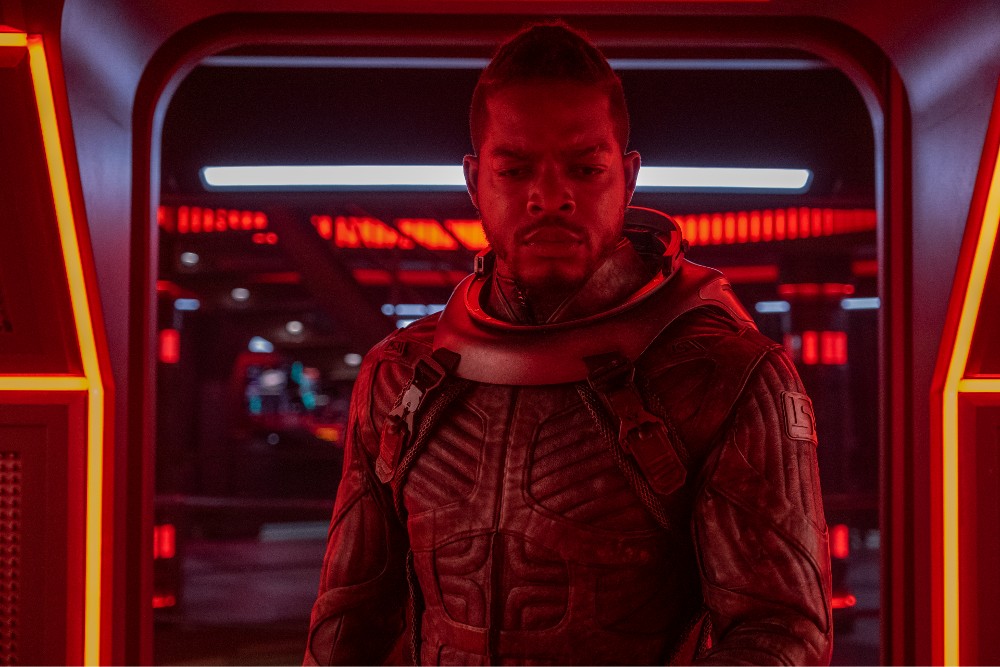
ATL: In terms of the scope of the piece, how much is VFX and how much are practical sets?
Mazzara: Pretty much everything you see in the interior is practical. A lot of the screens in the background were built and designed, and they were shot practically. There were certain inserts, certain maps, or certain effects that were created in visual effects. There was a tremendous amount of work done on this. There were thousands of visual effect shots, but one of the things that we really wanted to focus on was that we wanted the visual effects to support the story. So yes, there are a lot of visual effects, but it was not something that we really relied on. There were some episodes in which we started to represent different experiences and different realities, and we were very careful to try to do that as practically as possible, to rely more on the camera work than to have to cut to visual effects. I’m very proud of all the work from the visual effects team. I think a lot of that looks beautiful. Hopefully people love the visual effects on the show, but when they see it, they realize it’s a character drama at heart.
ATL: Talk about why you are so attracted to horror and sci fi and those genres.
Mazzara: I like telling stories, and I read a lot. I read a lot of different stuff, and when I was a kid, I was a geek, and I read horror, sci-fi, and fantasy. That’s what I love. I just love it. But a lot of times, when I see these things done on TV, I feel like they kind of fall into cliche. So I’m always looking to sign on to a show that wants to kind of push the boundaries a little bit and do something fresh, something that adds to the genre. So I think in the horror work I’ve done on The Walking Dead and Damien, I think we did that. I think this certainly does that. This is very different from other sci-fi things. Most sci-fi franchises become epics very fast, and they become about war, one side against the other, and all of that. This is a very personal story, so I was able to kind of find myself in this story a bit. I was interested in the characters. I loved working with Lena and Stephan. I just find it entertaining and fun, and that is what I go to. My wife does not want to watch this stuff with me. I end up watching a lot of sci-fi and horror by myself. (laughs)
ATL: When pushing boundaries, what was the inspiration for the flying droid?
Mazzara: You’d have to ask Zak who created Bart and everything. My contribution to that was, How do we make this feel fresh? How do we make this feel different from other droids we’ve seen, you know, R2D2 or what have you? Do we just give it a different type of personality so that it doesn’t play as Hal from 2001: A Space Odyssey? We realized that our AI Bart is just as traumatized as any of our other characters and makes human-level mistakes as much as anyone else.
ATL: What’s interesting, Glen is the AI character, and I’m wondering, was this way before the world started freaking out about the dangers of AI?
Mazzara: A lot of that comes from Zak, as he was very interested in AI at different levels and the evolution of AI. As the show continues, we have the story developed for multiple seasons, and AI is a big part of it. I will say that when I first joined the show, I was a bit confused. It was so dense. I really hadn’t ever written about AI before, so I had to get up to speed. It all makes sense when you start tracking the story and you start looking at how things are changing and what’s happening, particularly with different levels of AI, each with their own agenda. It really becomes a fresh take. So, having just been on strike with the Writer’s Guild and the AI issues being so relevant, what’s been interesting is that I think our story still adds something fresh. When people watch this, I don’t think we’re rehashing the usual tropes. I think it’s very advanced, and it continues to be very advanced. I think we give people a lot to think about.
ATL: You mentioned the Writer’s Guild. Can you talk about your work with championing writers from diverse backgrounds?
Mazzara: That’s something I’ve been doing since I was on The Shield, which was predominantly written by middle-aged straight white guys. When you have such a diverse cast, that doesn’t feel authentic. So we started diversifying that writing staff. But it was interesting to see how much pushback I got from the industry at that time, 20 years ago. I started learning about the biases and limitations of the industry. and just realized that a lot of people were not being given an equal opportunity. I became an advocate for change. I’ve met a tremendous number of writers. I’ve mentored a lot of writers. I’ve worked with a lot of writers. Shonda Rhimes and I were the co-chairs of the inclusion and equity group for 12 years at the Writers Guild. Listen, I love working in TV and making shows, but I believe my impact on the industry will be helpful to hopefully raise the bar a little bit. I think that’s kind of the work that I’ve done that I’m really proud of. I’m just one voice. There’s a tremendous amount of people who I’ve learned from in that. So that’s been an important part of my career personally. And I thank you for asking about that.
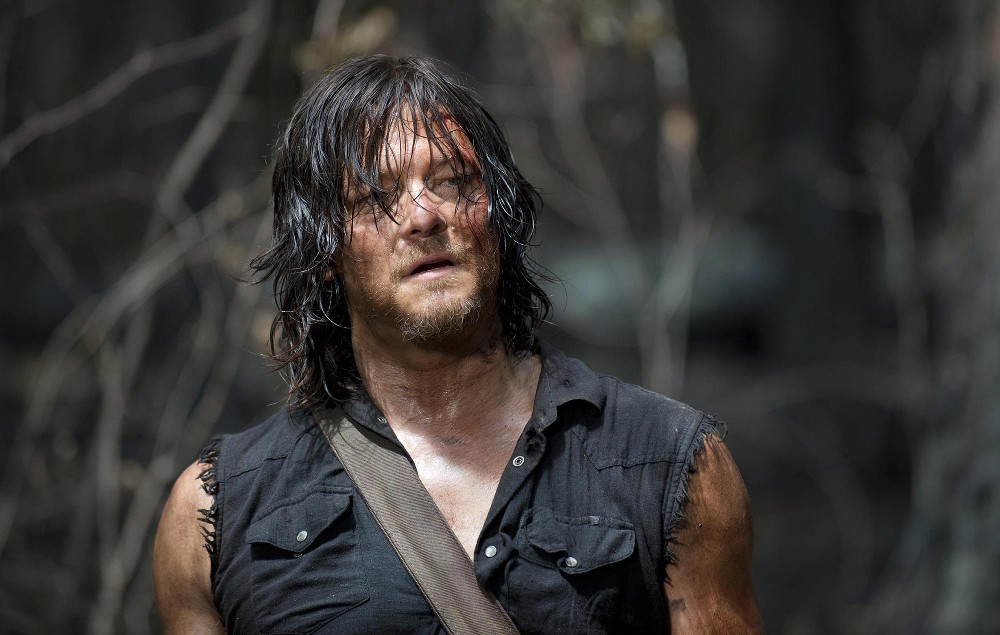
ATL: In the short amount of time we have left, I would be remissed if I didn’t ask you about Daryl Dixon and working with Norman Reedus from the beginning on The Walking Dead.
Mazzara: I loved working with Norman. I thought he was incredible. I think one of the things that I was proud of about The Walking Dead was that there were some times that in the first two seasons, when he was a little in the background, he was getting lost in the shuffle. And so going into season three, I just said he would be Rick’s right-hand man, so we sort of put him front and center, just put him at the top of a line going through the forest with his crossbow, and he’s got some great arms [laughs], and he just dominates the screen. I loved working on that show. I learned a lot from [creator] Frank Darabont. I enjoyed working with [writer] Robert Kirkman. You know, the cast was fantastic. That was another challenging shoot, but in that one, I would say I really learned about how to write cinematically. I learned that from Frank Darabont about editing, and so it’s all about the filmmaking. There was a creative shift that I had, and I’m very lucky to have worked on that show. I would say I’ve tried very hard since then to accomplish what I learned. I shot a pilot, Stephen King‘s Dark Tower, that didn’t go, but I did a show called Damien, and I was very mindful of the filmmaking aspect of TV, but I really didn’t have that before I worked with Frank Darabont on The Walking Dead. It was a very fond memory.
ATL: What would you say was your main contibution in shaping Beacon 23?
Mazzara: My main strength on this show was editing. I’m a very aggressive editor. When we were shooting, I was getting into writing the material for Season Two. There’s Season Two in the can, and it was really about, “How do we properly set up some of that material? How do we thread some of those things back through season one? How do we unify the story?” A lot of that was about moving scenes around, cutting things, and putting the puzzle pieces together. This was a very, very collaborative piece where we would go back and maybe add this, or we need a line here, or we need a reshoot, or whatever. I’m very excited about the scripts that I wrote. I’m really proud of them, and they were fun and different and bizarre and weird, and I hope people enjoy them. I would say my contribution here was really in post and kind of pulling it together, which on a sci-fi show like this, a lot of it is done in the visual effects and the music. We have the composer from Game of Thrones, William Marriott. They’ve done a phenomenal job. Our sound team is unsurpassed. Just really fantastic people. I’ve had a blast working on the show, but I think a lot of it was really getting to kind of flex some different muscles than I usually do. I’m proud that I was able to contribute to the show. I was able to collaborate with so many talented artists. I’m very pleased with how the show came together. I hope the audience enjoys it as much as we enjoyed making it.
ATL: But the trick is convincing your wife to watch it!
Mazzara: No, that’s okay. She watched a trailer. She says, “Oh, it looks good.” So I’ll take the win! (laughs)
Beacon 23 premieres on streaming via MGM+ on Sunday, November 12.


